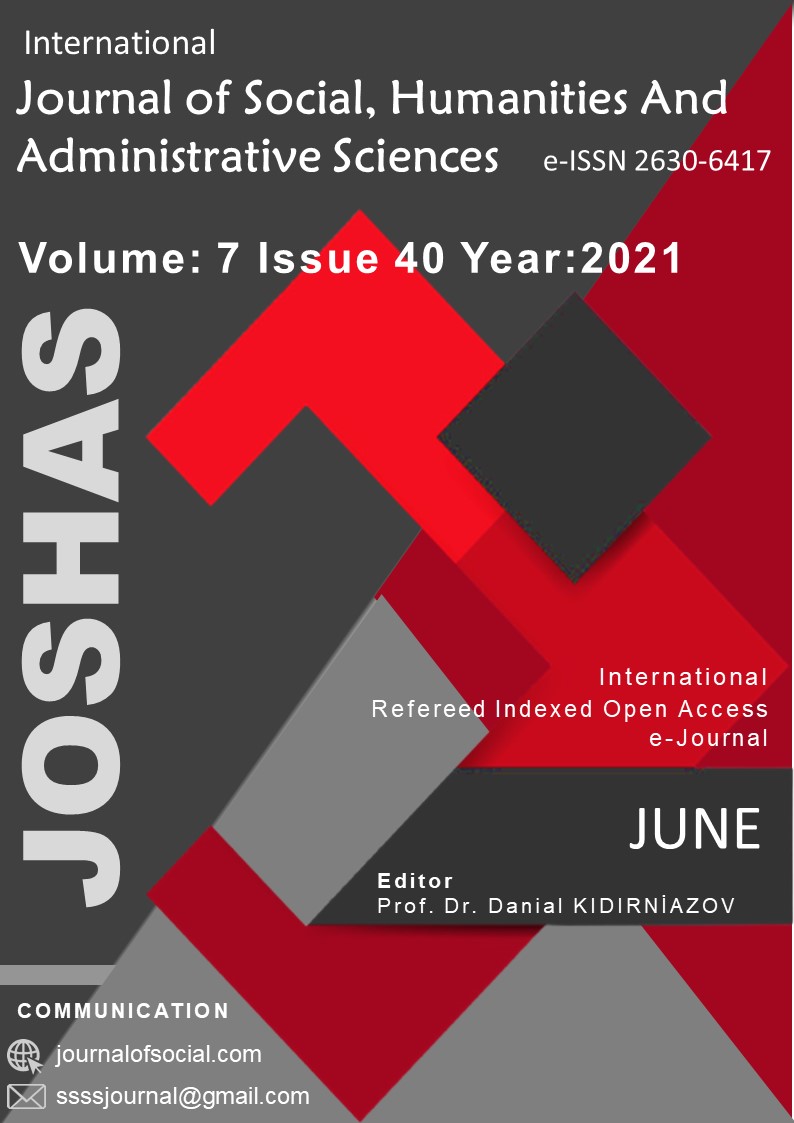Author :
Abstract
Bu çalışmada, Hacı Bektaş Velî ve “insan olmak” konusu, Hacı Bektaş Velî’nin Makâlât adlı eserinden hareketle “kendisi gibi olmayan” (diğer milletler, insanlar), “kendini tanımak”, “aşk”, “iyi olanı emir, kötü olanı yasak bilmek”, “fenâfillah” ve “gönül” kavramları ışığında ele alınmıştır. Nitel yöntemde doküman analizi tekniğiyle hazırlanan bu çalışmanın boyutları göz önüne alındığında, bu kavramlar, dört kapı kırk makam olarak tasarlanıp düzenlenen eserin her bir kapısından örneklem olarak seçilmiştir. Hacı Bektaş Velî’de gönül, her kapıyı açan sembol kavramdır. Kendi ve kendi gibi olanları ötekilerden ayırmayan Hacı Bektaş Velî, “insan olmak” konusundaki fikirlerini özlü sözlerle ifade etmiş, tüm insanları sevgiye, barışa, iyi olanı emir kötü olanı yasak bilmeye davet etmiştir. Sonsuz olana duyulan koşulsuz sevgi, aşk, mutasavvıfın tek gönül rehberidir. Öyle ki aşk, tasavvufta insanı insan yapan son eylemdir, şahsî tecrübedir. Aşka düşmeyen, “İlâhi Bir”e kavuşmayı arzulamayan insan tasavvuf yoluna giremez, kendini tanıyamaz. Dolayısıyla tıpkı Mevlânâ’da, Yunus’ta olduğu gibi Hacı Bektaş Velî’de de ‘aşk’, insan olma yolculuğunda insanı “İlâhi Bir”e ulaştıran tek rehberdir. Böylece rehberi Allah aşkı olan kişi, insan olma yolculuğu sonunda ait olduğu bütünün içinde kendine ait varlık konumunu keşfeder. Çalışma sonucunda, Hacı Bektaş Velî’nin ilkin “insan olmayı” kendisinde gerçekleştirmiş kâmil insan olduğu görülmüştür.
Keywords
Abstract
In this study, Hacı Bektaş Veli and the subject of "being human", referring to Hacı Bektaş Veli's work named Makâlât, "who is not like himself" (other nations, people), "knowing yourself", "love", "knowing what is good is an order, knowing what is bad" and "heart" concepts. Considering the dimensions of this study prepared with the document analysis technique in qualitative method, these concepts were selected as samples from each door of the work, which was designed and organized as four doors and forty makams. In Hacı Bektaş Veli, heart is the symbol that opens every door. Hacı Bektaş Veli, who does not distinguish himself and those like him from others, expressed his ideas about "being human" in concise words and invited all people to love, to peace, to know what is good and what is bad is forbidden. Unconditional love and love for the eternal is the only heart guide of Sufis. So much so that love is the last act that makes human beings human in Sufism, it is a personal experience. A person who does not fall in love and does not wish to attain the "Divine One" cannot go on the path of Sufism, cannot know himself. Therefore, in Hacı Bektaş Veli, 'love' is the only guide that brings people to the "Divine One" in the journey of becoming human, just like in Mevlânâ and Yunus. Thus, the person whose guide is the love of God discovers his own position of existence in the whole he belongs to at the end of his journey to become human. As a result of the study, it was seen that Hacı Bektaş Veli was a perfect person who first "became human" in himself.
Keywords
- Afifi, E. A. (1996). Tasavvuf, İslâm’da Manevi Devrim. Çeviri: H. İbrahim Kaçar, Murat Sülün. Risale
- Afifi, E. A. (1996). Tasavvuf, İslâm’da Manevi Devrim. Çeviri: H. İbrahim Kaçar, Murat Sülün. RisaleYayınları, İstanbul.Akarpınar , R. B. ve Arslan M. (2007). “Tekke – Tasavvuf Edebiyatı”. Türk Halk Edebiyatı El Kitabı, Editör: Öcal Oğuz vd. Genişletilmiş 5. Baskı, Grafiker Yayınları, Ankara.
- Aktürk, H. ve Tuğrul, T. (2014). “Alevi Bektaşi Kaynaklarında İnsan Yetiştirme Modeli” Türk Kültürü ve Hacı Bektaş Veli Araştırma Dergisi, 2014 (72): 211-225.
- Artun, E. (2006). Dinî – Tasavvufî Halk Edebiyatı, Kitabevi Yayınları, İstanbul.
- Aydın, M. (1997). “Hacı Bektâş-ı Velî’de Dinî Boyut” Milli Bütünlüğümüz ve Hacı Bektaşi Veli,Hazırlayanlar: Ethem Ruhi Fığlalı ve Mehmet Aydın. Atatürk Kültür Merkezi Başkanlığı Yayınları, Ankara, 27-42.
- Banarlı, N. S. (1987). Resimli Türk Edebiyatı Tarihi –I. MEB Yayınları, İstanbul.
- Ceylan, Ö. (2010). Böyle Buyurdu Sûfî, Tasavvuf ve Şerh Edebiyatı Araştırmaları, Kapı Yayınları, İstanbul. Chittick, W. (2003). Tasavvuf (Kısa Bir Giriş), Çeviri: Turan Koç. İz Yayınları, İstanbul.
- Çapan, P. (2010). “Nazan Bekiroğlu’nun ‘Lâ Sonsuzluk Hecesi’ Adlı Romanında Âşık ve Maşuk Üzerine”.Turkish Studies International Periodical For the Languages, Literature and History of Turkish or Turkic Volume 5 (3) Summer 2010.
- Eraydın, S. (2011). Tasavvuf ve Tarikatlar, (9. Baskı). Marmara Ü. İlâhiyat Fakültesi Yayınları, İstanbul. Fığlalı, E. R. (2006). Türkiye’de Alevilik Bektaşilik, İzmir İlahiyat Vakfı Yayınları, İzmir.
- Gündoğan, A. O. (2002). “Din ve Dogmatizm”, Ethem Ruhi Fığlalı'ya Armağan, Yayına Hazırlayan: Ali Osman Gündoğan, Vadi Yayınları, Ankara.
- Güngör, E. (1982). İslâm Tasavvufunun Meseleleri, Ötüken Yayınları, İstanbul.
- Gürsoy, K. (2006). Bir Felsefe Geleneğimiz Var mı? Etkileşim Yayınları, İstanbul.
- Güzel, A. (1992). “Ahmet Yesevî’nin Fakr-nâmesi ile Hacı Bektaş-ı Velî’nin Makâlât’ı Arasındaki Benzerlikler”, Milletlerarası Ahmed Yesevî Sempozyumu Bildirileri, Ankara.
- Güzel, A. (2002). Hacı Bektaş Velî ve Makâlât, (Genişletilmiş 2) Baskı. Akçağ Yayınları, Ankara. Güzel, A. (2006). Dini – Tasavvufi Türk Edebiyatı, (3. Baskı) Akçağ Yayınları, Ankara.
- İz, M. (1990). Tasavvuf, Mâhiyeti, Büyükleri ve Tarikatler, Yayına Hazırlayan: M. Ertuğrul Düzdağ, Yaylacık Matbaası, İstanbul.
- Kam, F. (2015).Vahdet-i Vücûd, Kapı Yayınları, İstanbul.
- Kara, M. (1995). Tasavvuf ve Tarikatlar Tarihi, (3. Baskı) Dergâh Yayınları, İstanbul.Köprülü, F. (1988). Osmanlı Devletinin Kuruluşu, (3.Baskı) TTK Yayınları, Ankara.Köprülü, F. (1993). Türk Edebiyatında İlk Mutasavvıflar, Diyanet İşleri Baş., Yayınları, Ankara. Ocak, A. Y. (2011). Türk Sufìliğine Bakışlar, (12. Baskı) İletişim Yayınları, İstanbul.
- Schimmel, A. (2012). İslâm’ın Mistik Boyutları, (3. Basım) Çeviri: Ergun Kocabıyık. Kabalcı Yayınları, İstanbul.
- Topçu, N. (1999). Varolmak, “Istırabın Manası”, Yayına hazırlayanlar: Ezel Erverdi, İsmail Kara, Dergâh Topçu, N. (2005). İslâm ve İnsan, Mevlânâ ve Tasavvuf, (4. Baskı) Dergah Yayınları, İstanbul.
- Tuna, T. S. (2016). Edebiyat ve Felsefe Bağlamında Dini-Tasavvufi Türk Edebiyatında İnsan -13. Yüzyıl Anadolu’sunun Başlıca Mutasavvıfları Üzerine Bir Deneme, Çizgi Yayınevi, Konya.
- Türkçe Sözlük (1988). Yeni Baskı. 2 Cilt. TTK Basımevi, Ankara.
- Uludağ, S. (1995). Tasavvuf Terimleri Sözlüğü, Marifet Yayınları, İstanbul.
- Yazır, Elmalılı M. Hamdi 2014. Hak Dini Kur’an Dili Meâli. (3. Baskı) (Sadeleştirenler: Lütfullah Cebeci, Sadık Kılıç) Akçağ Yayınları, Ankara.
